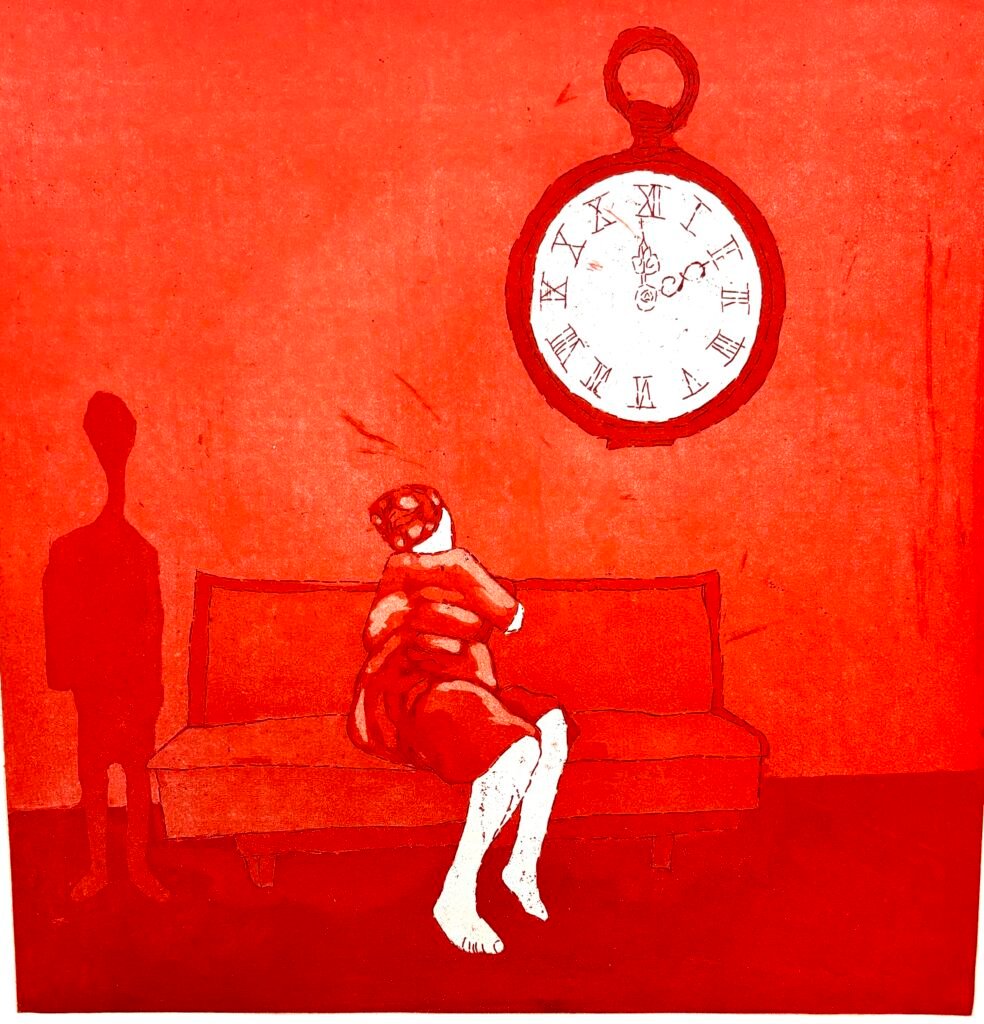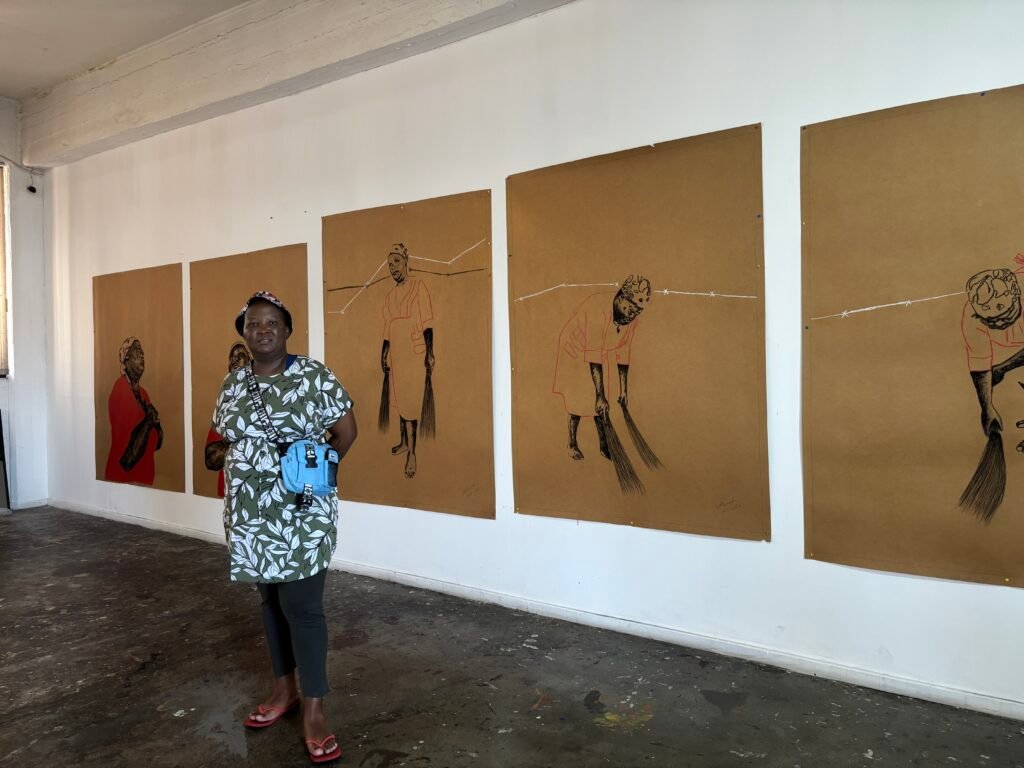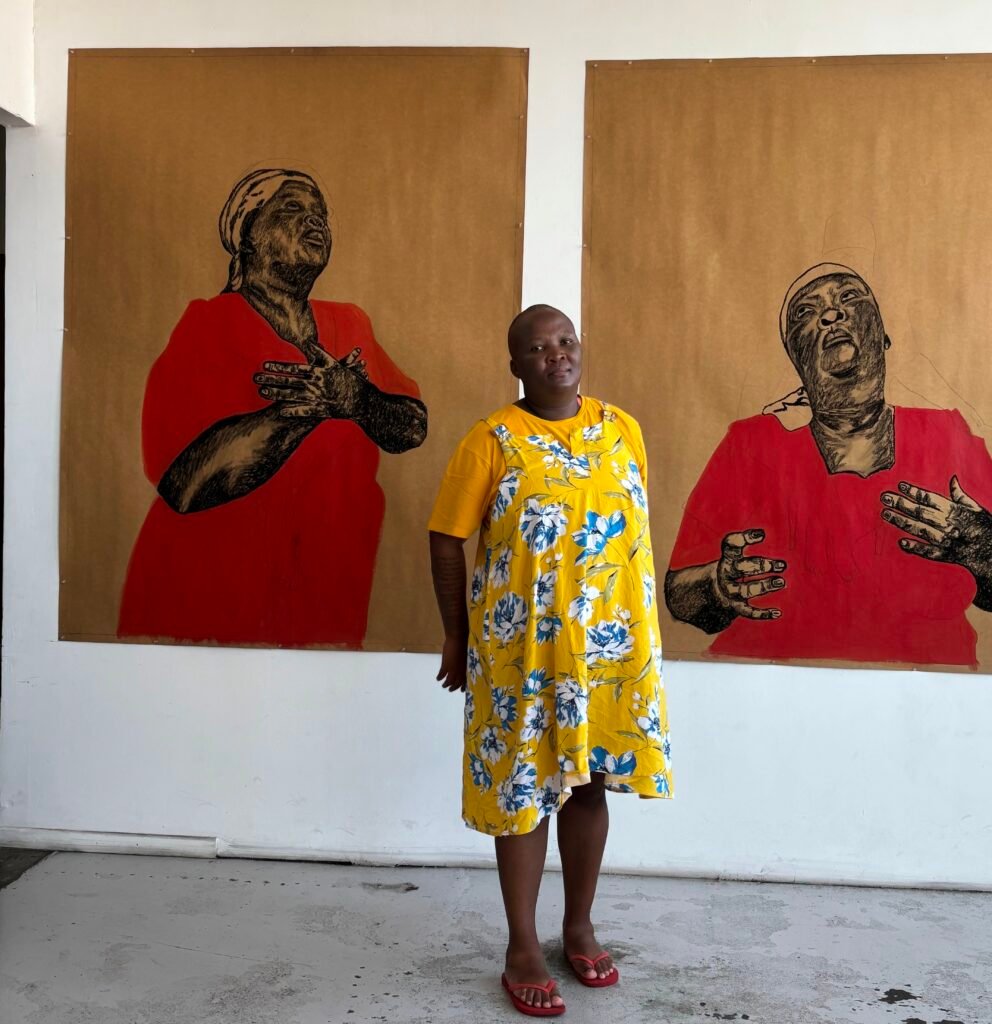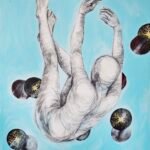
Ellis Art House Projects
Present
2 O’clock
A solo exhibition by
Senzeni Mthwakazi Marasela
Opening Reception: 16th February 2025, 2pm
Location: Ellis House Art Gallery, 23 Voorhout St, New Doornfontein, Johannesburg
Exhibition Duration: 16th February to 11 March 2025
Join us for the opening Reception at 2 O’Clock!
RSVP: Events@ellisarthouseprojects.org
Safe parking bays * Uber better
Senzeni Mthwakazi Marasela: 2 O’clock
Senzeni Mthwakazi Marasela’s art practice is a deep exploration of personal and collective histories, identity, loss, and the socio-political contexts of South Africa, particularly the experiences of Black women. In her latest work, the etchings centred around a persona named Theodorah, Marasela weaves together memory, longing, and historical trauma to produce evocative images that tell a story not only of personal grief but of broader cultural dislocation and displacement.
This body of work is intricately linked to Marasela’s ongoing studio practice at Ellis Art House in Johannesburg, where she has spent time reflecting and developing current ideas since joining the Still Artists Residency. The residency has provided a space for her to experiment with new mediums, particularly charcoal and large-scale paper drawings, which have become the foundation of her etching series. For Marasela, drawing has always been the starting point for exploring her ideas, and it is through this practice that she reinterprets themes of absence, migration, and loss in her visual language.

The etchings that culminate from this work are deeply rooted in both personal family histories and broader South African socio-political realities. Theodorah, who emerged in 2002, is a central figure whose narrative has evolved over the years. She represents not only Marasela’s own reflections but the experiences of numerous South African women who have had to endure the absence of men lost to war, economic migration, or systems of oppression. Theodorah’s story, set against the backdrop of the migrant labor system and apartheid-era urbanization, mirrors the painful history of displacement experienced by numerous families in South Africa.
The heart of Theodorah’s story is her journey to Johannesburg in search of her husband, Gebane, who, like many men from rural villages, disappeared into the city’s economic and labor systems. His disappearance is symbolized by the bus he boarded—the two o’clock bus—a transport that historically marked the departure of men who rarely returned. In Marasela’s etchings, the two o’clock bus is a symbol of irreversible change, a moment in time when lives are disrupted, and futures are uncertain. Through Theodorah’s persistence and waiting, Marasela evokes the emotions of hope, longing, and abandonment experienced by women left behind.
The narrative of Theodorah is shaped by Marasela’s family stories, particularly those passed down from her grandmother. These stories, filled with gaps and omissions, highlight the elusive nature of Black South African history, often reduced to fragments in the wake of displacement. Marasela’s grandmother referred to a time known as the “red dust” era—a period of uncertainty marked by the migration of men to cities in search of work. This concept of “red dust” resonates throughout the work, especially in the choice of color and texture, evoking both a historical and emotional terrain. The red symbolizes not only the trauma of loss and grief but also a broader collective memory that cannot be fully captured or recorded.
The etchings are steeped in red, which signifies a duality in Marasela’s work: it represents both life and death, love and violence, the known and the unknown. The rich red hue is not only a reminder of the “red dust” memories of her grandmother but also a representation of the bloodlines and sacrifices embedded in the histories of those who were subjected to apartheid’s systemic erasure. The use of red also grounds Theodorah’s journey within the earth, linking the emotional and physical landscapes of South Africa. Marasela’s choice of this color palette adds layers of complexity to the narrative, turning the absence of Gebane into a poignant symbol of collective histories lost and remembered.
Johannesburg, where Theodorah searches for Gebane, is depicted as both a beautiful and hostile city. In Marasela’s etchings, Johannesburg is not just a backdrop but a symbol of the broader socio-political system of migration and exploitation. The city, with its transient and oppressive nature, is shown as a place where Black South Africans were historically allowed to work but not to truly belong. Marasela’s use of Johannesburg in this context is both a critique and a portrayal of the systemic erasure and displacement faced by Black women who, like Theodorah, exist in spaces that were not meant for them.
Theodorah’s search is portrayed as a solitary and internal journey. The etchings capture her in liminal spaces—train stations, bus stops, and alleyways—spaces that are both physical and metaphorical. The images represent a woman caught between hope and resignation, torn between the possibility of love and the inevitability of loss. These spaces are not meant to sustain her, but she navigates them in search of survival and meaning. The emotion conveyed in these prints is a complex mixture of hope, fear, and uncertainty, encapsulating the profound internal world of waiting. Each line etched into the surface of the plate represents a layer of persistence, a mark of Theodorah’s refusal to give up on the possibility of love, even when the odds are stacked against her.
The process of etching itself mirrors the emotional and psychological journey of the protagonist. Etching, with its method of layering ink and physically carving into the plate, becomes a metaphor for the excavation of grief, memory, and loss. Marasela’s use of this technique is not only a means of creating an image but a method of exploring time, history, and identity. As she etches, she excavates layers of personal and collective memory, turning the process into a powerful metaphor for the way time and trauma are etched into the lives of those who experience loss.
The work also evokes parallels with historical and literary figures like Penelope from Homer’s Odyssey and Charles Dickens’ Miss Havisham, who also waited for absent partners. In this context, Marasela draws attention to the intersecting personal and political grief of women who have experienced the absence of their loved ones—whether due to war, migration, or systems of oppression. The legacy of apartheid and its impact on family structures and Black identity are central to this reflection, as Theodorah’s search for Gebane becomes an exploration of the gaps in South African history.
The work’s ultimate significance is both personal and collective. Theodorah’s journey is not just about the absence of one man but reflects the broader historical experience of women who have been made to wait—not only for the return of their loved ones but also for recognition and justice in a world that has been unkind to them. Through Theodorah, Marasela critiques the systems that perpetuate such waiting, drawing attention to the persistent absence of justice, recognition, and belonging for Black South African women.
The “2 O’clock” etching project, a culmination of Marasela’s time at the Still Artists Residency, serves as a reflection on these powerful themes of loss, absence, and survival. Each print is a fragment of Theodorah’s story, but it is also a broader commentary on the collective experience of Black South African women who have had to navigate histories of displacement, loss, and the search for meaning. Through her evocative use of etching and charcoal, Marasela captures the emotional weight of these experiences and the enduring hope and resilience that define them.

About Senzeni Marasela
Senzeni Mthwakazi Marasela, a founding member of Ellis Art House Projects, is an acclaimed South African artist whose work explores themes of memory, loss, and identity. Ellis Art House Projects provides a collaborative space where artists support each other, fostering creative growth and community engagement.
Her work is featured in several prominent collections, including the Iziko South African National Gallery, The Museum of Modern Art in New York, and private collections worldwide. Marasela’s art continues to resonate with audiences, reflecting the deep historical and emotional landscapes of South Africa.




